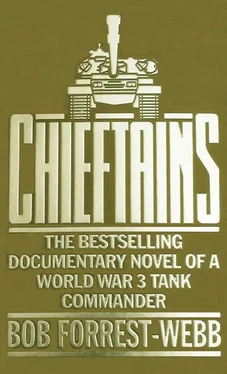'In Turkey, Soviet forces crossed the frontiers at Batumi, Yerevan and Nachichevan, while a Soviet naval assault force has made landings on the Turkish Black Sea coast between Sinop and Samsun. Concentrations of Bulgarian troops have been reported on the Turko Bulgarian frontier at Malko, three hundred and twenty kilometers from Istanbul.
'In Yugoslavia, despite strong resistance, Soviet authorities this morning announced the capture of Novi Sad and Belgrade. Throughout the early hours of today Belgrade Radio played continuous recordings of the Yugoslav national anthem. This was silenced a little after 09.00 hours…'
'That'll do, Corporal. Turn it off now.' The staff sergeant's slim cigarette was already a butt between his lips. He picked it out carefully, and dropped it into a near empty mug on the table. 'All right you lot, don't hang around…get back to your work…this is an official war we've got…earn your bloody money…'
The headquarters of the Commander-in-Chief of the Allied Forces in Northern Europe was situated, temporarily, a few kilometers east of Münster. Commander-in-Chief, General Sir Alexander Dormer, had moved his staff two days previously eastwards from Rheindahlen to its present battle headquarters. He had slept for less than three hours in the past twenty-four, but a Benzedrine tablet had cleared fatigue from his mind. There would be time for rest when the situation in NORTHAG became more settled.
Dormer was feeling satisfied with the intelligence reports he was receiving. The Russian forces were continuing their advance, which had been expected. But the advance had been neither as fast, nor had the initial penetration been as deep, as had been forecast. Their losses in the first kilometers had been astronomical, despite their advantages in military strength, their armour outnumbering that of the NATO forces by almost three to one.
Three to one. Sheer weight, Dormer knew, could win a war no matter how dogged the adversary. There had been sufficient warnings given over the past few years, and yet many of the NATO governments had ignored them, seeking political popularity while endangering the future military security of their countries. Britain had been no exception; in 1980, the British military budget had been cut by two hundred million pounds.
There had been an attempt, far too late, to redress the military balance, but many engineering companies which could have been used on military projects had gone to the wall during the recession, and new ones to replace them had not been fully developed. Defence projects had been allowed to decay too far to be hurriedly salvaged. Much of the NATO weaponry was out-dated and long-serviced, but what there was of it was being well used. To his present satisfaction, the 1st British Corps were giving a good account of themselves, as were the men of the German and Belgian forces. In the north the Netherland Corps, reinforced by the German Federal Republic's territorial army, had slowed the Soviet forces east of Hamburg.
It had been no surprise to Dormer when the French entered the war immediately it had begun. He had worked closely with their High Command many times and never doubted their intentions, despite their government's apparent determination to remain non-commital. The French armour was already being brought into reserve, behind the American army in CENTAG.
The Atlantic air-bridge, 'Reforger', was not only holding but was growing rapidly. The massive Lockheed CXs which had been built in increasing numbers over the past five years, and the old Galaxies, were now proving their worth With near maximum payloads of 220,000lbs – as much as two M-60 tanks, or three helicopters – they were refuelling in the air while en route from the USA to the airbases in Europe. Most aircraft of the European and American civil airlines had been immediately brought into service as troop and supply carriers. Dormer was feeling increasingly confident that if the Soviet advance could be contained for a further forty-eight hours they might be willing to negotiate a peace. At this stage, when negotiation was still possible, he did not personally believe there was much likelihood of a nuclear war developing. Though he had little respect for Russian leadership, he did not consider them to be maniacs. They would demand a high price for peace, perhaps even the re-unification of Germany under Soviet control, and it would then be for politicians, not soldiers, to decide if the ransom should be met.
On the situation maps of the NORTHAG battlefront, General Sir Alexander Dormer could see clearly the present extent of the Warsaw Pact advance; the maps were continuously being adjusted by his staff, brought up-to-date the moment information became available from the various fronts. The battle computer system had removed much of the guesswork from strategy, though the early loss of many of the NATO reconnaissance satellites had proved very damaging.
At the moment, the Soviet forces had done little more than straighten the old frontiers. In the north, they threatened the city of Lübeck in a push towards Kiel. The largest immediate loss of territory had occurred between Lauenburg and Bergen, where a peninsula of Federal Germany, the Wendland, had been attacked simultaneously from north and south, west of the river Jeetze, and a heavy Soviet air drop at Hitzacker had unexpectedly established a bridgehead. The Elbe at this point was wide, and it had been thought the NATO defences were adequate, but a complete airborne division from the Mongolian Peoples Republic of the USSR had been used in the assault. It had been one of the possible contingencies of modern warfare; the Americans had proved the feasability of flying airborne troops into battle from great distances, and the Soviet command had been quick to see how it could be exploited to overcome problems caused by competent enemy surveillance in battle areas. The sudden involvement of unexpected numbers of men and fighting vehicles could easily disrupt the calculations of planned defence. The loss of the Wendland was Dormer's only present regret. It had been expected, but he had hoped the river Jeetze, which cut south across the whole peninsula of land and then east towards the border, would have proved more of an obstacle to the Soviet advance, and further increased their heavy casualty figures.
It had long been admitted it was impractical to consider establishing a main line of defence at the Eastern German border. With an increasingly mobile type of warfare, and against the great strength of the Warsaw Pact countries, a did wall technique would tend to produce near matching losses for both attackers and defenders. By using more flexible techniques, reserves could be held in readinass until the inertia was lost from the Soviet invasion, their shock troops no longer effective, and their supply lines stretched. At such a time, the Warsaw Pact armies would be at their most vulnerable, and the NATO powers at their strongest.
Dormer read the decoded message just received from SACEUR – Supreme Allied Commander Europe. 'Reference use of chemicals in various sectors, retaliatory action is in order.'
The message had been carefully worded to ensure the final decision rested with him…not only the decision, but the responsibility! Reports of chemicals had reached headquarters on several occasions throughout the day, but there appeared to have been no concentrated attacks. And in no instances had the use of chemicals been sustained. It had been difficult for him to decide whether it had been deliberately used but in limited and almost experimental circumstances, or released by pure accident; perhaps the destruction of a vehicle equipped with chemical weapons.
The communications deer knew the contents of the message and was waiting for Dormer's reaction. 'Do you want me to pass it to divisional levels, sir?'
Читать дальше












